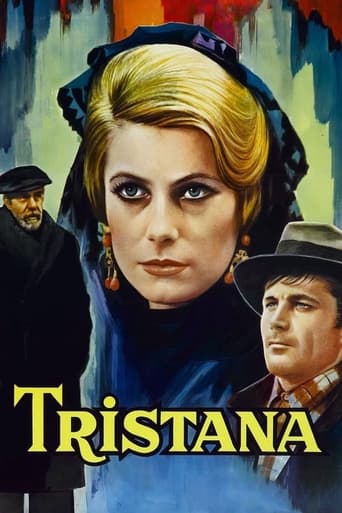Kirpianuscus
a simple story. nothing more. same themes of Bunuel universe. same clash between innocence and impulses. the air of ancient Greek tragedy, in which all is leading by faith. impressive performances of Catherine Deneuve and Fernando Rey. the transformation of Tristana . and the ambiguous status of victim. it is a confession - film. not the confession of characters or director but one of the viewer.because it is good occasion to discover yourself front to the spider web of a story about sensuality and cruelty and challenges , in the atmosphere imposed by Bunuel as clothes for each word and gesture. a film who impose the cold air as the protective window.
Movie Critic
I must have watched a different movie than the reviewers who call this "the top movie of all time" a 10 plus and so forth.First of all dubbing robs 90% of an actor's abilities and the two main characters are dubbed De Neuve and Fernando Rey..it sounds like a spaghetti western. Also the many times used theme of a Gigi like uncle who falls in love with his niece (charge in this case) is not shocking or particularly interesting. Zola used it in Dr. Pascal.As another reviewer states this is a novel turned into a movie so all the changes that occur in DeNeuve seem too abrupt as they try to pack 300 pages into an hour and half. Suddenly Tristana is a bitter woman....from an innocent girl. Also please if this is a world quality movie why did the director use that tired old technique of showing the hands only when Tristana is playing the piano. Also although very minor there were slip ups in the time editing...a modern car can be seen in the back ground of one of the scenes and the train lines were electrified.I am sure the movie can be micro-analyzed for symbolism and visual cues..on the door of the apartment they live in is the faint white scrawl of a man's face and so forth (death?).I am sure it is flawless in this way...but as far a convincing as to why DeNeuve turns jaded it just doesn't work well---the dubbing and the abruptness mainly...I did find the main character's hypocrisy good a socialist ordering glazed maroons and living the high life....although in a leftie directors eyes this may not have been intended to be hypocrisy but rather showing his sophistication. God knows that is quite possible.I did not quite understand the deaf young men's symbolism. Didn't find it worth speculating on.DO NOT RECOMMEND
MisterWhiplash
It might appear to the uninitiated that Luis Bunuel is making with Tristana at first a good but very predictable melodrama that turns somewhere in the second half mark into a strange power-play of desire turned on its head. But in reality, when looking at it after seeing a couple of his films, Bunuel's work with Tristana is somehow kind of touching. He cares about all of his characters- none of whom what they seem or dumbed down to Lifetime movie levels- and in this stuck-in-its-ways society there are boundaries that are crossed in tragic means. Usually one might expect some dark or subtle comedy of manners or satire on society, but here it's stripped away, as it was for some of Viridiana, and all that's left is a spare, tense and expertly manipulated tale where the tables are turned once or twice on the couple of Don Lope (Fernando Rey) and Tristana (Catherine Deneauve, maybe her most physically demanding of her two Bunuel roles).One thing that's extraordinary about how Bunuel directs and allows for his actors to play the scenes is that the emotions are only heightened to a certain level, and never with the aid of things like music or tears. It is what it is: Don Lope has taken care of Tristana as her guardian since her mother died, and now has inserted himself as her father/husband figure, with his servant Saturna (stern-faced but understanding Lola Gaos) a kind of unofficial confessional. Tristana wants some freedom, just to go out and walk around, and feels caught by Don Lope even when not doing anything... until she meets Franco Nero's Don Horacio, a painter who could promise a new life. This goes without saying that one should take it for granted that Tristana isn't *that* young and could take care of herself without Lope, but maybe this is part of the point of the slight absurdity- and eventual tragedy- of this struggle.Two years go by after she leaves Lope for Horacio, with a tumor in her leg. She's now a cripple, and now once again a kind of mental prisoner in Lope's home; the complexity of old man Lope as being duplicitous is seen right after he finds out she's sick and Horacio asks for Lope to help keep her home, and he nearly skips home saying "she'll never leave again!" All of this, leading up to a final twist that is very satisfying if extending the tragic dimension of Lope and Tristana, would be soapy and tawdry and, possibly, very standard in other hands. For Bunuel, there's a lot of personal ground here; I wonder at times if Rey is a little like one of those actors a director of Bunuel's auteur-stature uses as a means of expressing himself through an actor, or if it's just because he's so good at playing wicked AND sympathetic bourgeois. And the mixture of ideas, if not really themes, covering what's love and over-control, religion, deformity, a free will are potent and exciting even in such subtle and (as Maltin said) serenely filmed territory.It's also a minor triumph for Deneuve, who between this and Belle de jour did some of her best work as an actress for the notorious surrealist. Her character's continual dream of Lope's beheaded top dangling from a church tower is the closest we see to a classic surrealist scene, though it's reminiscent of Los Olvidados as brilliantly expressing one character's mind-set. Deneuve is up for the challenge of putting up a tough interior and exterior presence; she gets paler towards the end (if this was for real or just a bad print I couldn't tell), and there's a lot of pain in her eyes and expression throughout. It's great work for one of the director's most subtly demanding works- beneath its conventional framework of a love-triangle story is sorrow and horror at the human condition.
Henry Fields
One of the latest works from the genius of Calanda, he was still stigmatized by Franco's dictatorship and he adapted a text by Benito Pérez Galdós about a young pretty girl (Catherine Deneuve) whose mother dies and has to go to live (and something else) with his stepfather (Fernando Rey)."Tristana" contains many of the common factors of Buñuel's movies: his total contempt for the ruling sectors of society and the rich people, for hypocrisy and Puritanism; his irreverence, and a wicked and implicit sexual content. Only the man who made "Belle de Jour" would dare to amputate a leg to the goddess Deneuve (one of the most beautiful creatures that ever walked the earth). Fernando Rey plays a typical Spanish "hidalgo" that's come down in the world and that sexually harass his stepdaughter.So, Buñuel not only hadn't lost his touch with the years, on the contrary, he felt more and more free as the time went by to let his genius flow… *My rate: 8/10






